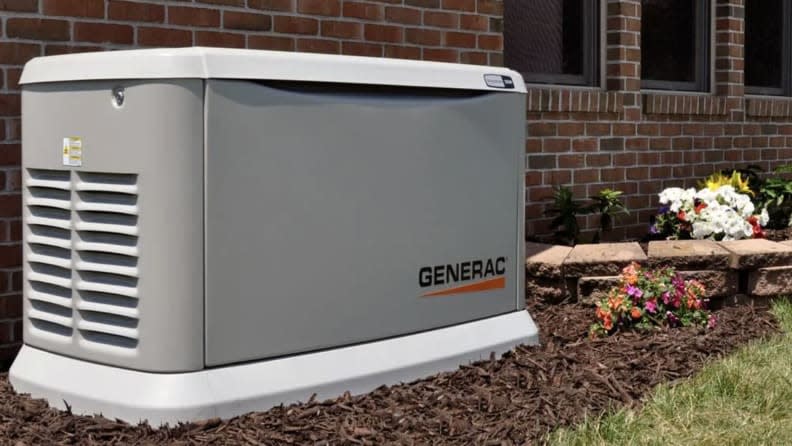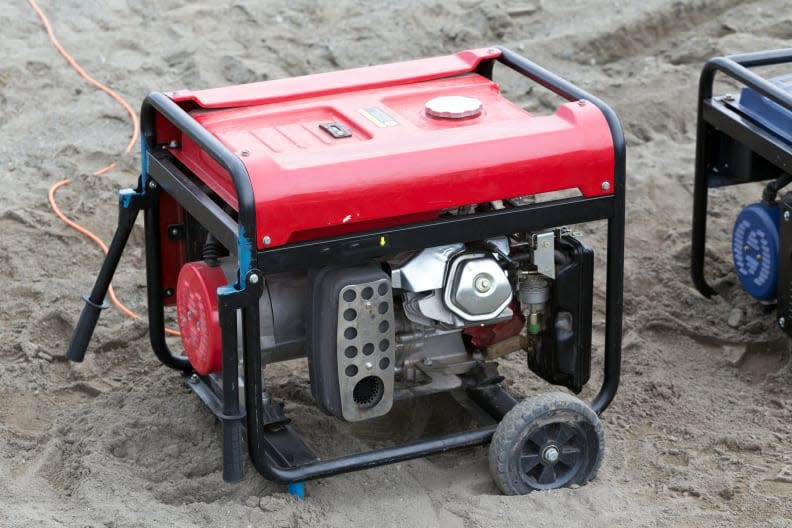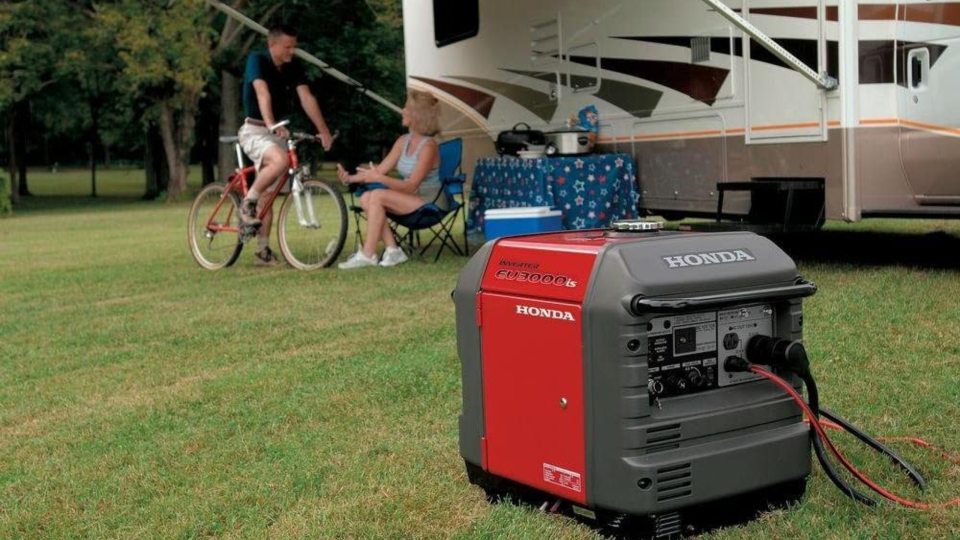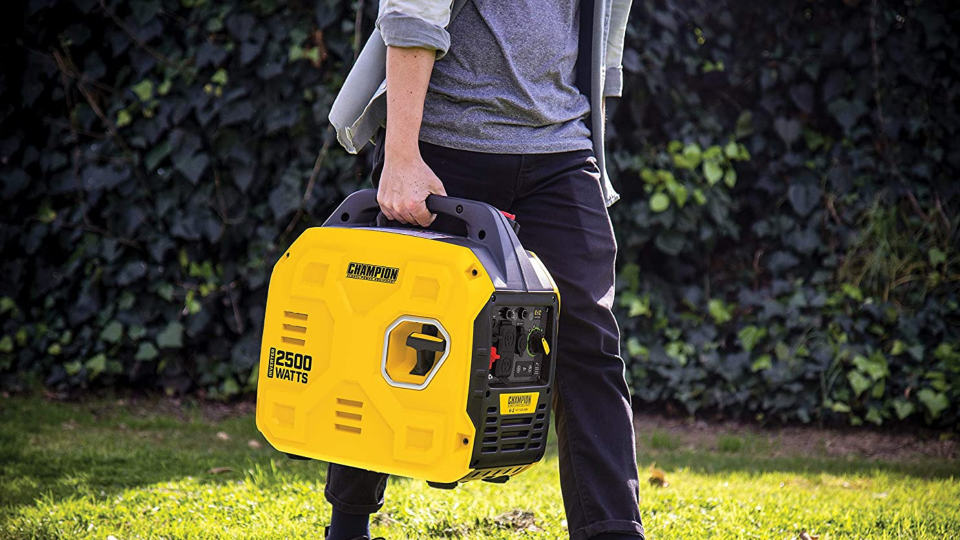A record number of people are buying generators—here's why to consider one

— Recommendations are independently chosen by Reviewed’s editors. Purchases you make through our links may earn us a commission.
Power outages can happen in an instant and without any warning. Not only are they inconvenient, but outages can pose danger when critical appliances aren't available to use such as heating and cooling systems, refrigerators and medical gear like CPAP machines. With increasingly severe weather on the rise, along with aging utility infrastructure, power outages are predicted to be more frequent and to occur for longer periods of time.
Get deals and shopping advice delivered straight to your phone. Sign up for text message alerts from the experts at Reviewed.
That's why backup generators are becoming a popular home purchase for many. Generac, a leading generator brand, told Reviewed they saw net sales increase 50% in 2021. Additionally, over the past 20 years, Generac has seen a steady increase in standby generator installations, making it clear that generators are becoming a top priority product for emergency situations.
There is a lot to consider before buying a generator. There are many different types on the market ranging in wattage, run time and budget. No matter which you choose, they must be operated properly and safely or they can pose real risks to users. Before investing in a generator, here's what you should know, including the types of generators you can buy, how to use generators safely and our top picks for generators you can buy right now.
Types of generators to choose from

There are four main types of backup generators: Standby (or whole-house), portable, inverter and portable power stations.
Out of the four, portable and inverter generators are the most popular on the market as they’re easy to transport and can be effective for powering anything from small gadgets to air conditioners. Compared to standby generators—which require on-site installation and can cost thousands of dollars—these devices are also considered more affordable. Inverter and portable generators do come with their downsides, though. The directions for operation may be complicated for some and these tools can be dangerous to use if you don’t take certain safety precautions.
Standby generators, while a major investment, can efficiently power your entire home. If the only reason you’re buying a generator is to provide total coverage during a power outage, a standby generator is your best bet—just keep in mind it won’t come cheap. In addition to the high cost of the unit itself, you also need to factor in the price of on-site installation.
If you don’t have the resources necessary for a portable, inverter or standby generator, but still want to make sure you always have the use of your phone during a power outage, a portable power station is a good compromise. These devices don’t burn fuel at all—they are actually more similar to large, rechargeable batteries that you plug in and use. They might lack the power and longevity you can get from other types of generators, but they’ll keep your laptop and smartphone going during emergencies.
How to safely use and maintain your portable generator

Portable generators can be useful products when a power loss strikes, especially in the case of emergency situations. However, they can come with their own set of risks, especially when used improperly. Here's what you should know before getting your generator set up.
Generators produce carbon monoxide, a colorless and odorless gas, which the excess presence of can result in sickness or death and pose other dangers like electrocution or fire when used improperly.
The first rule of thumb when it comes to generator safety—no matter the kind—is to never, ever use them indoors. The U.S. Department of Energy recommends keeping generators outdoors, at least 15 feet away from the home or open windows to keep exhaust fumes from entering the home.
Many power outages come as a result of severe weather like a hurricane or strong storm. While you may want to use your generator right as the storm passes through, you should not use it in rainy or wet conditions. Your generator should sit under a “canopy-like structure” to keep it dry and you should never touch the generator with wet hands.
In addition to these safety tips, you should also maintain your generator just like you would any machine. You should change the oil regularly, after about 50 or 60 hours of use, or earlier if your generator is brand new. The experts at Generac recommend changing the oil filter every time you change the generator's oil.
You should also inspect your air filter regularly, changing the filter every two years or more frequently depending on your environment's air quality.
Finally, spark plugs should be checked and replaced every 400 hours—no, you won't need to keep track of this, but you'll know it's time for a replacement if the engine is idling rough, the engine misfires or the unit is going through more fuel than normal.
For more details on generator safety guidelines, visit the U.S. Department of Energy’s site.
Top-rated generators to buy right now
Westinghouse WGen950

This dual-fuel portable generator has just about everything you could need in a generator: it’s on wheels for portability, runs on propane or gas, features a large-capacity tank and can be started easily with a simple switch.
Reviewers note that this generator can operate a fridge for more than 10 hours on a single tank of gas in addition to other small devices. If you don’t want to rely on gas, the ability to quickly hook up a propane tank is invaluable, making this a powerful and flexible generator.
Get the Westinghouse WGen950 from The Home Depot for $1199
Honda EU3000IS

When it comes to small engines—in just about any form—Honda is the name to beat. It's true for portable generators, where Honda typically reigns supreme. You’ll definitely pay less for other brands, but nothing matches Honda for reliability, service and durability in small engines.
This particular portable gasoline generator is a bit larger than some other Honda models, with a 3,000-watt running capacity. That’s more than enough to run a small air conditioner or full-size refrigerator. Honda claims this generator can run for up to 20 hours on a single tank of gas, though most reviewers pegged it at closer to 15 hours with typical usage and dipping to around eight hours if you really push it.
Get the Honda Power Equipment EU3000IS from Lowe's for $2,349
Champion Power Equipment 200951

If you want a relatively small, compact generator, this inverter generator model from Champion Power is a great choice that happens to be affordable, too. Inverter generators are lightweight options that use advanced electrical technology to provide a more stable, efficient power output.
The Champion Power is easy to carry and place wherever needed, yet it can easily power a critical appliance like a fridge or TV. The main thing to know about this generator is it only runs off of gasoline, and it only delivers enough power to run a standard 20A circuit through two 120V plugs. It will run for about seven to eight hours on a tank, according to reviewers, and it’s relatively quiet. But if you want to power your entire house, a larger generator may be called for.
Get the Champion Power Equipment 200951 from Amazon for $440.10
There’s a lot more where this came from. Sign up for our twice-weekly newsletter to get all our reviews, expert advice, deals and more.
The product experts at Reviewed have all your shopping needs covered. Follow Reviewed on Facebook, Twitter, Instagram, TikTok or Flipboard for the latest deals, product reviews and more.
Prices were accurate at the time this article was published but may change over time.
This article originally appeared on Reviewed: Home generator rising sales: Where to buy backup standby, portable

